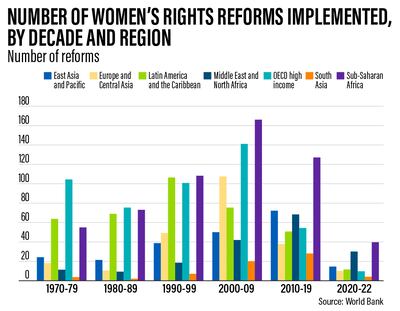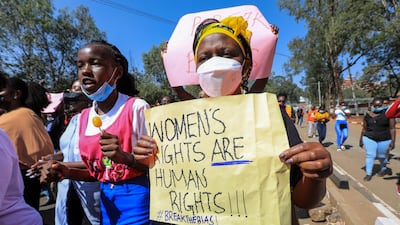The pace of legal reforms concerning the equal treatment of women around the world has plummeted to a 20-year low, posing a potential threat to sustainable and inclusive growth at a critical time for the world economy.
At the current rate of reform, in many countries, a woman entering the workforce today will retire before she can gain the same rights as men, the World Bank said in a report on Thursday.
Women, on average, have only about three fourths of the rights granted to men by the law, the Washington-based lender said.

“At a time when global economic growth is slowing, all countries need to mobilise their full productive capacity to confront the confluence of crises besetting them,” Indermit Gill, chief economist of the World Bank Group and senior vice president for development economics, said.
“Governments can’t afford to sideline as much as half of their population. Denying equal rights to women across much of the world is not just unfair to women; it is a barrier to countries’ ability to promote green, resilient and inclusive development.”
The annual report assesses 190 countries’ laws and regulations in eight areas related to women’s economic participation — mobility, workplace, pay, marriage, parenthood, entrepreneurship, assets and pensions.
The data — which is current through to October 1, 2022 — offers measurable benchmarks for global progress towards legal gender equality.
The latest Women, Business and the Law report evaluates global progress made in pursuing gender equality through the law over the past 50 years.
Since 1970, the global average Women, Business and the Law score has improved by about two thirds, rising from 45.8 to 77.1 points, the lender said.
In 2022, economies adopted the fewest gender-related reforms in more than two decades, while some countries are even reversing previously granted rights.
Currently, only 14 countries — all of them high-income economies — have laws that give women the same rights as men, the World Bank report found.
Globally, about 2.4 billion women of working age still do not have the same rights as men.
Last year, only 34 gender-related legal reforms were recorded across 18 countries — the lowest since 2001.
Most reforms focused on increasing paid leave for parents and fathers, removing restrictions for women’s work and mandating equal pay.
It will take another 1,549 reforms to reach substantial legal gender equality everywhere in the areas measured by the report.
At the current pace, it would take at least 50 years on average to reach that target, the multilateral lender said.
A trend of “reform fatigue” has emerged in terms of legal gender equality, especially in areas with long-established norms, such as the rights of women to inherit and own property, the report said.
New analysis of the data shows that economies with historically larger legal gender gaps have been catching up, especially since 2000.
Currently, equal economic opportunities for women are highest in Organisation for Economic Co-operation and Development high-income economies but important reforms have continued in developing countries, the report showed.
Sub-Saharan Africa made significant progress last year. The region accounted for more than half of all reforms worldwide in 2022, with seven economies — Benin, the Republic of Congo, the Ivory Coast, Gabon, Malawi, Senegal and Uganda — enacting 18 positive legal changes.
However, more needs to be done globally to ensure tangible results in the pursuit of equal opportunities under the law for women, according to World Bank.
“Women cannot afford to wait any longer to reach gender equality. Neither can the global economy,” it said.


